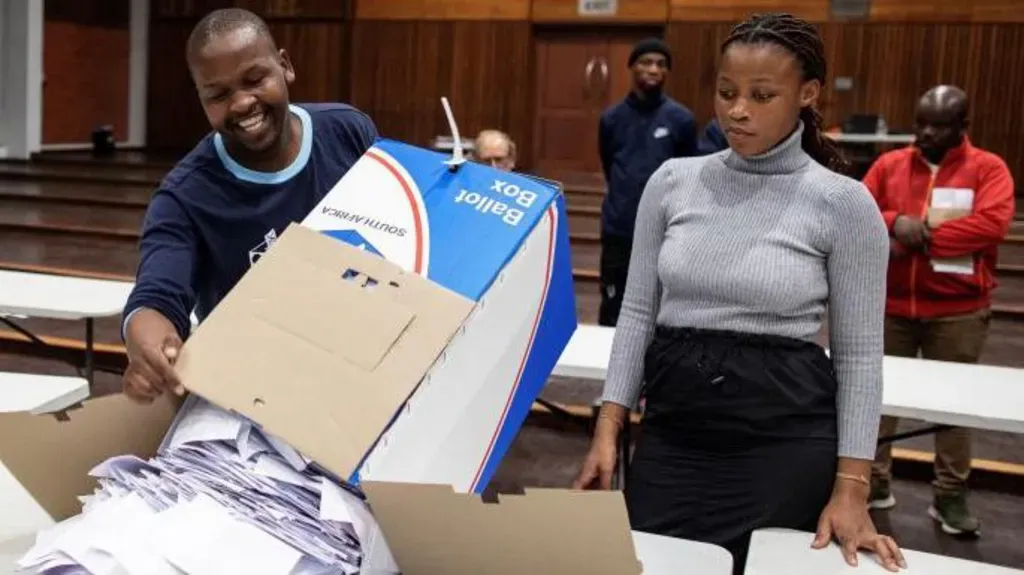JOHANNESBURG, South Africa — The African National Congress (ANC), South Africa’s ruling party for the past 30 years, is on course to lose its parliamentary majority for the first time, according to partial results from Thursday’s parliamentary election.
With more than 50% of voting districts counted, the ANC leads with 42% of the vote, followed by the Democratic Alliance (DA) with 23%. Former President Jacob Zuma’s uMkhonto weSizwe Party (MK Party) has received nearly 11%, while the Economic Freedom Fighters (EFF) are at 10%. Final results are expected over the weekend.
Voters have expressed dissatisfaction with the ANC, blaming the party for high levels of corruption, crime, and unemployment. Projections by the Council for Scientific and Industrial Research (CSIR) and the News24 website suggest the ANC’s final vote share will be around 42%, a significant drop from the 57% it received in the 2019 election. This decline would necessitate forming a coalition with one or more other parties to maintain a majority in Parliament.
The DA advocates for liberal economic policies, whereas both the EFF and MK favor more state intervention and nationalization. The choice of coalition partner could significantly influence South Africa’s future direction.
It remains uncertain whether President Cyril Ramaphosa will stay in power. If the ANC’s final vote share is below 45%, he could face pressure to resign, according to Prof. William Gumede, chairman of the non-profit Democracy Works Foundation. “The ANC could turn him into a scapegoat, and a faction within the party could push for him to be replaced by his deputy, Paul Mashatile. The EFF and MK are also likely to demand his resignation before agreeing to any coalition with the ANC,” Prof. Gumede told the BBC.
South Africans vote for members of Parliament, who then elect the president. Early results show the ANC losing ground to MK, particularly in KwaZulu-Natal, where Zuma’s party leads with 43% to the ANC’s 21%. Zuma’s departure from the ANC to campaign for MK in December caused a significant shock, particularly in his home region of KwaZulu-Natal, which is crucial in determining the ANC’s parliamentary majority.
Despite being barred from running for Parliament due to a conviction for contempt of court, Zuma’s name appeared on the ballot as MK leader. If MK wins in KwaZulu-Natal, it would be a “major upset” and signify the “potential decimation” of the ANC in the province, according to Prof. Gumede.
The ANC also risks losing its majority in Gauteng, the economic heartland, where it currently has 36% compared to the DA’s 29%.
Wednesday’s election saw long lines at polling stations late into the night across the country. According to the electoral commission, the last polling station closed at 3:00 a.m. on Thursday. An electoral official in Johannesburg told the BBC that the queues were reminiscent of the historic 1994 election, when Black people could vote for the first time.
“Freedom is great, but we need to tackle corruption,” said Sifiso Buthelezi, who voted in Johannesburg’s Joubert Park, the largest polling station in South Africa.
Change has been a recurring sentiment, especially among young voters. “The turnout amongst them was high, and they voted against the ANC,” said Prof. Gumede.
Ayanda Hlekwane, part of South Africa’s “born-free” generation born after 1994, noted that despite holding three degrees, he remains unemployed. “I’m working on my PhD proposal so that I go back to study in case I don’t get a job,” he told the BBC in Durban. However, Hlekwane remains optimistic that things will change.
Support for the ANC is expected to be higher among the older generation. Elayne Dykman, 89, expressed hope that young South Africans do not take their vote for granted.
A record 70 parties and 11 independents ran in this election, with South Africans voting for a new Parliament and nine provincial legislatures. The DA has signed a pact with 10 other parties to form a coalition government if they secure enough votes to dislodge the ANC, although this outcome remains unlikely. The ANC is still expected to be the largest party, positioning it to lead a coalition.
https://www.africanexponent.com/south-africas-anc-faces-historic-loss-of-parliamentary-majority/


